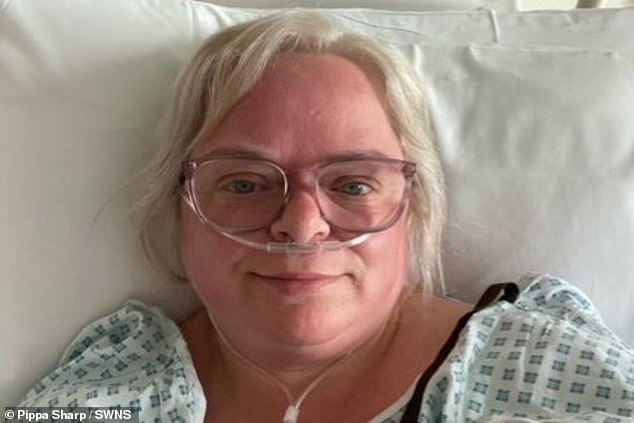Woman, 49, forced to have genitals removed after ‘dismissing’ deadly intimate cancer as ‘severe thrush’
A Leeds woman is warning Britons to ‘check their genitals’ for signs of cancer after her disease was discovered so late that it had spread to other organs and she needed life-changing surgery to remove her entire genitals.
Pippa Sharp, 49, thought she had a severe case of recurring thrush for five months until she noticed a sore on her vulva – the outer tissue of the female genitals.
Thrush is a common yeast infection that affects the genitals of both men and women. It is usually harmless, but can cause irritation and pain.
Mrs Sharp was prescribed antibiotics by her GP, but four days later she noticed that the sore did not go away.
After being given antibiotics that did not help, her family referred her for a biopsy, which revealed she had vulvar cancer.
Pippa Sharp, 49, thought she had been suffering from a severe case of recurring thrush for five months and thought it had caused a painful, hard spot on her left labia
Initially, doctors thought the condition was limited to the swelling of her left outer labia.
However, a scan revealed that it was even worse than originally thought and that the disease had spread to the lymph nodes in her groin, meaning she was now in stage three.
She underwent surgery to remove the mass, 50 rounds of radiation therapy and five rounds of chemotherapy.
She also had to soak her vulva wound in a sitz bath – a warm small tub placed in a toilet – filled with betadine, an antiseptic.
After each treatment was completed, Mrs. Sharp was sent back to her doctor, who said he would check her again in three months.
But in January 2024, she began to notice the area becoming swollen again.
She added: ‘I spoke to the oncology nurses during my appointment with the specialist.
‘They were so helpful and made some suggestions about what could have been done differently.
“But I knew deep in my heart that the cancer was back.”
A month later, a biopsy confirmed her fears.
This time it had spread to two more places: Mrs. Sharp’s right labia and her ‘anus’.

After frequent bouts of thrush, Pippa noticed a small, hard, sore spot had developed on her left labia in August 2022

She initially dismissed it for five months, thinking it was just a symptom of bad thrush, but it turned out to be vulvar cancer.
On March 22, 2024, part of her right labia was removed.
Mrs Sharp said: ‘I was told I would need 30 radiotherapy sessions and a further five chemotherapy sessions.
‘We continued with the paperwork and I visited her again for the planning scan.
‘I told her that I was still concerned about my right labia and my anus.
“She stopped the treatment and referred me back for biopsies.”
In July, Mrs Sharp’s biopsies came back and it was confirmed that the cancer in her right labia had returned, despite the procedure.
She had it all surgically removed and is now waiting for the rest of the results before she can begin further treatment.
She shared her story and said she wants more women to know about the deadly disease so they can catch it before she does.
Ms Sharp, a former brand innovation and awards coordinator, said: ‘I used to be embarrassed about having vulvar cancer. But now I can’t stop talking about it.
“It’s a rare form of cancer, but that doesn’t mean people shouldn’t know about it.”
Ms Sharp’s ordeal began in August 2022, when she noticed a small, hard, painful spot on her left labia, which she initially dismissed as thrush.
In January 2023, a GP suggested it could be an infected cyst or cancer.
Although Pippa ‘immediately’ thought it was cancer, she agreed to take a course of antibiotics just to be sure.
She said, “Four days after I prescribed them, there was still no change.
‘I’m very cautious about health matters so I checked the NHS website because I knew it was reliable.
‘I had all the symptoms listed under ‘vulvar cancer’: from bloody discharge to persistent itching.’
Mrs Sharp returned to her GP on 23 January 2023, who performed a biopsy on the painful area, which ultimately led to her diagnosis.
“It’s really important for me to spread the message while I wait for the news,” she said.
We talk so much about having to check our breasts.
‘But we also need to check our vulvas regularly.
‘It’s a quick check when you go to the toilet, or when you’re in bed.
‘Feel for pain, lumps and bumps. Notice any unusual discharge.
‘Always see your GP if you are concerned.’
In the UK, around 1,400 women are diagnosed with vulvar cancer each year, with women aged 90 and over being most likely to develop the disease.
Only 58 percent of patients with vulvar cancer are expected to survive 10 years after diagnosis, with the disease claiming the lives of nearly 470 Britons each year.
It is thought that approximately two-thirds of vulvar cancers are preventable, of which an estimated 69 percent are caused by infection with the human papillomavirus (HPV).
HPV is a virus that is often spread through sexual activity and usually does not cause symptoms. However, some viruses are associated with an increased risk of various cancers, including vulvar and cervical cancer.
This is partly why people in the UK are now offered the HPV vaccination at secondary school.
